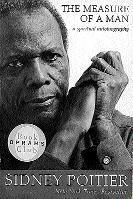
Cooke Title: The Measure Of A Man
Author: Sydney Poitier
Publishers: Harper, San Francisco
Reviewer: Mel Cooke
I was reminded of the last instalment in the Lord of the Rings trilogy when I was wading my way through the final two chapters of Sydney Poitier's The Measure of a Man, two chapters which were a letdown after a satisfactory lead-up.
Not that the stern-faced man who (bristling) said "they call me Mr. Tibbs!" in In The Heat of the Night and for whom Lulu sang To Sir With Love in ... OK, you know the movie ... has anything to do with the line "I can't carry the ring, but I can carry you". But just as that flick went on and on and on with life lessons at the end of the action, so does Poitier with his spirituality at the close of The Measure of a Man.

The warning signs of such meandering are there on the cover; it is, after all, dubbed a 'spiritual autobiography', but we are interested in Poitier not because of his sense of a higher being than himself and a higher calling than acting, but because of acting and his life around that very public activity. If he wants to wax spiritual, fine; but weave the wax within the tale of his life and not deliver it unadorned.
No one eats margarine on its own. But with bread and crackers, now, that's a different matter. The good thing is that before the dollop of Country Crock only Poitier had integrated the margarine of his spirituality with the tasty bread of his life, so it is not all heavy-handed heavenliness.
Poitier's outright statement of the measure of a man comes three chapters from the end of the 255-page book (including a 10-page index), as he writes:
"As I've mentioned, a large part of my father's legacy is the lesson he taught his sons. He brought us together and said, 'The measure of a man is how he provides for his children.'
Sage advice
That provision is not only material it is admirable thatPoitier stuck to his restaurant guns even when bigger roles started coming in, albeit not regularly enough to cover the family's said needs. It goes to the extent of maintaining that commitment in the face of a divorce. And who does Poitier get sage advice from but Harry Belafonte.
" ... He said to me from his own experience, 'Always be there for your children, no matter what. If they're supposed to come visit you and they don't want to, they've got to come ... If they don't want to talk to you, they don't have to talk to you; but they have to be there. You can put the food on the table, but they don't have to eat. They can spend the whole weekend in their rooms, but they're going to know you cared enough to have them with you ...'"
In the end, Poitier writes, "Where I've invested most in the future of this planet, unreservedly and from the deep heart's core, is through the lives of six talented and intelligent young women, truly beautiful human beings, whom I burst with pride to call my daughters."
(Wipe away a tear, y'all.)
Poitier's involvement with Belafonte comes from the early going of the former's career, when good ol' Harry bumps Sid from his first major stage role. Well, that was before a throat bug bumped Belafonte in turn, so up went Poitier in a horrible production in which he was good enough to get noticed by the critics.
Life is not a stage
Of course, life is not a stage and The Measure of a Man starts with Poitier's early life on Cat Island, The Bahamas, where he lived the very simple life (no electricity, no running water) until nine, when the family moved to Nassau. It was there that his father Reggie's measure was taken, as the proud, independent fisherman took to peddling cigars when the sea was not enough to see the family's way through.
His mother, Evelyn, was not to be found wanting either, as she broke rocks (in a process that seems very similar to the stone-breaking operations in Jamaica of the late 1970s) and sold them for the small price they would fetch.
Poitiertakes up on his journey to Miami where he has a 50-block encounter with trailing police who found him on the white side of town late in the evening and told him that if he looked around on the walk home he would be shot. He heads to Atlanta on a summer job as a teenager and from there heads to New York after a train station query, seeking the highest fare to get as far as possible North.
It is that journey that takes him into film history, Poitier exploring films such as Lillies of the Field, Blackboard Jungle and Patch of Blue, and attendant topics such as Why Do White Folks Love Sidney Poitier So? (He ain't ashamed, OK). His reading of the pivotal character in A Raisin In The Sun is especially poignant, pointing to his conceptualising of black manhood, as well as his willingness to go against the rest of the cast and even the writer, playing the frustrated attempted entrepreneur as the focal point and not the mother.
There are a couple near brushes with death (connected with water, come to think of it), Poitier pointing to his risk-taking nature and, of course, a higher being taking care of things (it is, after all, a spiritual autobiography).
There are some visuals, with the obligatory few pages of black and white photos in the middle (Sidney looks like Reggie), all making for a decent tale. Until there is that long ending.

